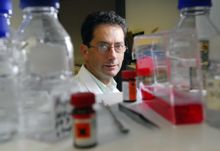2011 Press Releases
31.08.2011
Scientists at University College Cork (UCC) have shown that the active component (Norgestrel) of the contraceptive ‘Mini Pill’ prevents the loss of sight in mice that have degenerative eye conditions that normally lead to blindness. The research will be published in the September issue of The Journal of Neurochemistry.
People who suffer from the genetic condition Retinitis Pigmentosa lose their
sight because the light detecting cells in their eyes called photoreceptors
begin to die by the time they reach their mid-twenties.
In a screening of 1,200 commonly used drugs Professor Tom Cotter and his team
in the Biochemistry Department at UCC discovered that Norgestel did more than
just provide contraception in mouse models used to study blindness.
It also prevented the loss of the light detecting cells and the
sight of the mice was retained when the animals were given the drug at a
similar concentration used for contraceptive purposes.
“The drug seems to work by stimulating the production of a protein survival
factor called FGF from neighbouring cells in the eye and this helps the light
detecting cells to survive and the animals to see,” says Professor Cotter.
“FGF binds to the surface of the light detecting cells and sends a signal
to their DNA to up-regulate strong cells survival pathways. In other
words, it ‘beefs up’ the cells, makes them stronger and better able to resist
the destructive effects of the damaged gene that causes the disease. At the
moment we still don’t know if the drug will also work in humans.” The
scientists hope to begin a study next year to see if the protective effects of
the contraceptive ‘Mini-pill’ that are seen in animal models are also
experienced by humans.
The research was supported by Science Foundation Ireland, Enterprise Ireland,
and Fighting Blindness Ireland.
The research is being extended to other eye conditions such as glaucoma, a
common degenerative eye condition of people over 60, where the drug shows early
promise in the laboratory. This work will start in October (2011)
with a generous grant from the Heath Research Board of Ireland.
Picture: Professor Tom Cotter, Biochemistry
Department, UCC

